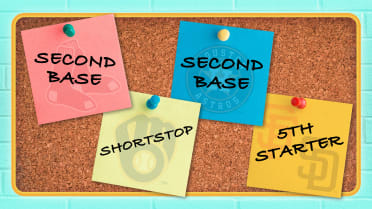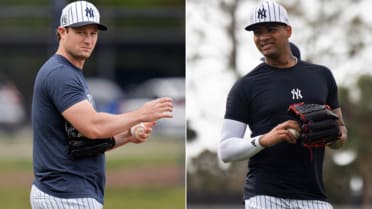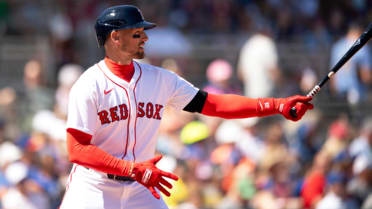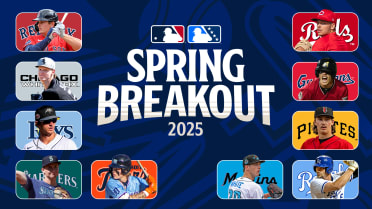The best players to never win MVP
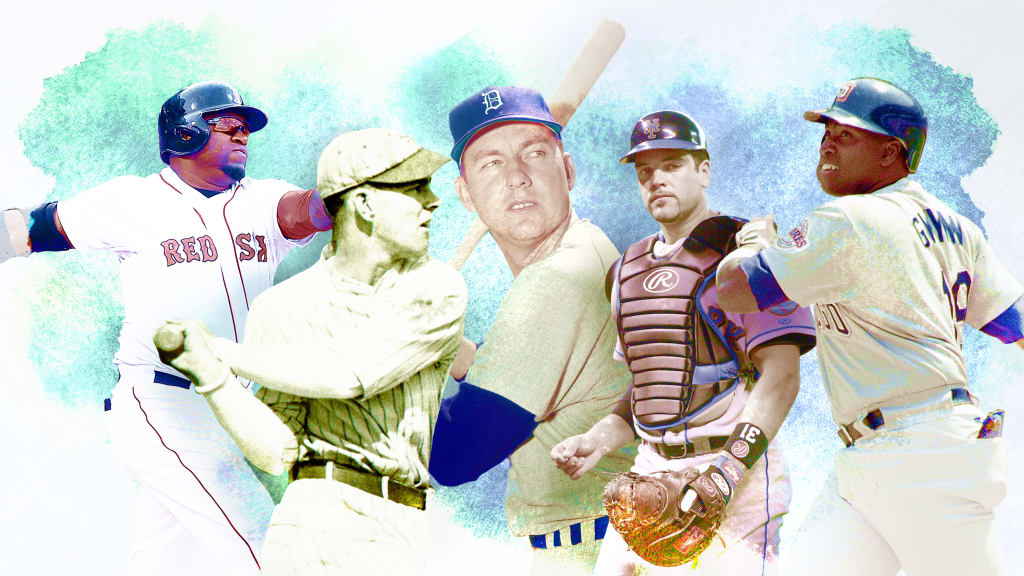
Awards are arbitrary and, often, products not just of great talent, but also great timing.
For some legends, those two elements never quite align. They get snubbed, beaten outright or simply have careers that were more about accumulation than accreditation. How else to explain Orson Welles never winning an Oscar, the Beach Boys never winning a Grammy or -- gasp -- Steve Carell never winning an Emmy for playing Michael Scott?
So it is with the Baseball Writers' Association of America's Most Valuable Player Award. The writers have been handing out this honor annually in the American League and National League since 1931. Yet one way or another, they've missed quite a number of legends along the way.
Here are 14 of the best players to never win the MVP. Note that we are only including position players whose prime years did not precede the creation of the BBWAA prize.
1) Derek Jeter
Best finish: Second place, 2006
He might not necessarily be the greatest player on this list, but Jeter is the greatest example of how you can be marquee in every way and still miss out on the game's most marquee individual award.
Jeter did finish second in the voting once (2006) and third twice (1998 and 2009). In '06, he fell just 14 voting points shy of winner Justin Morneau, and, with the benefit of hindsight and more reliable metrics, Jeter probably would have won that one. But hey, he's got five rings, a World Series MVP (2000) and near-unanimous entry into the Hall of Fame to fall back on.
2) Mel Ott
Best finish: Third place, 1942
Ott debuted as a 17-year-old in 1926, but the vast majority of his best seasons took place with the modern MVP honor in place. He missed out despite leading the league in homers six times (twice in years in which the Giants won the NL pennant) and garnering votes in 13 different seasons.
Had the Cy Young Award existed in 1936, Ott probably could have garnered enough votes to win the MVP, instead of losing votes and ground to teammate Carl Hubbell, who took home the prize.
3) Eddie Mathews
Best finish: Second place, 1953 and 1959
The first Sports Illustrated cover boy never finished first in the MVP voting. His best chances came when he led the Majors in homers in 1953 (47) and '59 (46). But in '53, his Milwaukee Braves finished second to the Brooklyn Dodgers, and Mathews, by extension, finished second in MVP balloting to the Dodgers' Roy Campanella. In '59, he and the Cubs' Ernie Banks had comparable numbers in most key categories, but Banks had 29 more RBIs and won out.
BBWAA voters weren't particularly kind to Mathews. He somehow had to wait until his fifth time on the ballot to get his rightful spot in the Hall of Fame.
4) Al Kaline
Best finish: Second place, 1955 and 1963
“Mr. Tiger” came of age at a time when you pretty much had to be a New York Yankee to win the MVP. OK, that's not technically true, but Yankees players won it eight out of 10 seasons from 1954-63. And in that span, Kaline had his three highest finishes, all behind members of the Bronx Bombers -- second behind Yogi Berra in '55, third behind Mickey Mantle and Berra in '56 and second behind Elston Howard in '63.
Kaline was rarely a league leader in any particular category of note, but, at a time when pitchers were dominating, he provided commendable consistency, with double-digit homers every year from 1955-74.
5) Tony Gwynn
Best finish: Third place, 1984
If you made a Venn diagram that represents the qualities that made Gwynn great and the qualities that are typically rewarded in the MVP voting, you would have two circles with very little overlap. Gwynn hit .338 for his career and captured eight batting titles. In his prime, he was a terrific defender and smart baserunner. He and Paul Waner are the only Live Ball Era players with at least 3,000 hits and fewer than 500 strikeouts.
But Gwynn wasn't a power hitter (he had a .500 slugging percentage just four times), and he played on only three teams that reached the postseason. The first was in his first full season in 1984, when he finished third. The others were in 1996 and '98, when he was still plenty productive but not at his peak.
6) Wade Boggs
Best finish: Fourth place, 1985
Like Gwynn, Boggs was one of the best pure hitters of his time and all time. He batted .328 for his career, with 3,010 hits. He won five batting titles. He led the league in on-base percentage six times. But his run production was not homer-oriented, and it affected his ballot showings at a time when voters didn't have access to the context-driven stats of today.
In 1986, when Boggs hit .357 with a .939 OPS on a Red Sox team that went on to win the AL pennant, the voters tabbed him the third-most valuable player on his own team, behind Roger Clemens (who won the award) and Jim Rice. Boggs finished seventh overall that year. And in '87, when he hit .363, banged out an uncharacteristic 24 homers and posted the highest OPS (not that anybody was paying attention to this) and Wins Above Replacement (this, either) among position players in the league, he finished ninth.
7) Eddie Murray
Best finish: Second place, 1982 and 1983
The downside to being “Steady Eddie” was that Murray was never “Explosive Eddie,” turning in a season that bowled over the voters.
Murray did come close a couple times. But you'd be hard-pressed to argue that he was robbed in either 1982 or '83. His best argument might have come in '84, when he finished fourth and was one of a handful of position players (including teammate Cal Ripken Jr.) with a stronger case than that of Tigers reliever Willie Hernandez, the actual winner.
8) Johnny Mize
Best finish: Second place, 1939 and 1940
“The Big Cat” posted his prime years from his debut in 1936 through 1948 (missing three years due to his contribution to the war effort). In those years, he compiled a .997 OPS. How many hitters had a better OPS in that stretch? Just two -- Ted Williams (1.129) and Hank Greenberg (1.038)
From 1937-40, this was an average season for Mize: a .341 average, 1.042 OPS, 31 homers, 115 RBIs. He lost out first to 27-game winner Bucky Walters of the Reds in 1939 (had the Cy Young Award been in place, Mize likely would have won the MVP), and then, inexplicably, to Frank McCormick of the Reds in 1940.
9) Mike Piazza
Best finish: Second place, 1996 and 1997
There are other catchers -- namely, Carlton Fisk and Gary Carter -- also deserving of being listed here. What stands out about Piazza, though, is that, despite the demanding defensive position, he put up the kind of offensive numbers traditionally associated with the MVP. He had nine seasons with north of 30 homers, six of those with north of 100 RBIs. He led his league in OPS+ twice (1995 and '97).
It's hard to find much fault with Piazza's second-place finish to Larry Walker in 1997. But Piazza would have been a worthy winner over the Reds' Barry Larkin in '95 (instead, he finished fourth).
10) Ozzie Smith
Best finish: Second place, 1987
You don't win the MVP for defense. That's true today, even with all the fancy and more reliable defensive metrics we have at our disposal. So it was certainly true in the 1980s, when everybody was fixated on fielding percentage.
While Smith is pretty widely regarded as the best defensive shortstop of all time (with 13 Gold Gloves to show for it), he had only four seasons in which his OPS+ was north of league average and only six seasons in which he appeared on MVP ballots. Relitigating Smith's second-place finish in '87 with the help of more modern metrics would actually hurt -- not help -- his cause, as he was fifth in the NL in WAR that season.
11) Manny Ramirez
Best finish: Third place, 1999 and 2004
“Manny Being Manny” did not include "Manny Being MVP." That's amazing when you consider the 555 career homers, the 1,831 runs driven in, the .312 average, the .996 OPS and the fact that he was on 11 playoff teams. This was one of the greatest right-handed hitters many of us will ever see. But Ramirez's greatest years -- he led the AL in OPS three times and claimed the 2002 batting title and '04 home run title -- came at a time when multiple guys were posting video-game numbers.
Manny's most impressive finish wasn't either of the third-place showings but, rather, when he finished fourth in the NL in 2008, after joining the Dodgers in a midseason trade and going absolutely bananas for 53 games.
12) Adrián Beltré
Best finish: Second place, 2004
Beltré had an unusual career. His offensive numbers slumped in what are typically considered a player's prime age years. He was more productive in his 30s than in his 20s. He accumulated more than 3,000 hits and nearly 500 homers without the benefit of many bonkers offensive seasons but, rather, through pure persistence.
So while Beltré's Cooperstown case, which is almost certain to make him a member of the Class of 2024, is strong, he didn't have many realistic shots at the MVP. His '04 OPS (1.017 OPS) turned out to be his career best by nearly 100 points, but, while he did manage to get six first-place votes that year, nobody was going to beat Barry Bonds back then.
13) David Ortiz
Best finish: Second place, 2005
A player has never won the MVP in a season in which his primary position was DH. And given the increasing emphasis a stat like WAR has on the MVP voting, we might never see a DH win this award. So Ortiz, whose primary position was DH the entirety of his great run with the Red Sox, never stood a realistic shot at this particular piece of hardware, though he did finish in the top three twice, along with five top-five finishes.
Ortiz ended his career on a high note by leading the AL in OPS, doubles and RBIs in 2016, but he finished sixth in the voting. Still, in 2022 he became a first-ballot Hall of Famer despite that lack of hardware.
14) Jim Thome
Best finish: Fourth place, 2003
Thome hit a bunch of dingers. He drove in a bunch of runs. He was on a bunch of good teams in his Cleveland years. And he was well-liked by the media (which, let's face it, appears to have been used as a criteria a time or two).
But Thome was quite often not the marquee guy on a given team in a given year. In three of his top five WAR seasons, he had a teammate (or teammates) finish ahead of him in the vote, and in one of those years (1995), he didn't garner any votes at all. In arguably his best season of 2002, when he led the AL in OPS (1.122) and OPS+ (197), he finished a distant seventh. Regardless, he and his 612 homers waltzed into the Hall on the first ballot.
Honorable mention: This list could go on and on and on. Many greats were snubbed here yet again: Luke Appling, Carlos Beltrán, Craig Biggio, Lou Brock, Robinson Canó, Gary Carter, Joe Cronin, Todd Helton, Ralph Kiner, Edgar Martinez, Mark McGwire, Paul Molitor, Rafael Palmeiro, Tony Perez, Kirby Puckett, Tim Raines, Scott Rolen, Al Simmons, Duke Snider, Alan Trammell, Arky Vaughan, Lou Whitaker, Billy Williams and Dave Winfield, just to name a couple dozen.
Anthony Castrovince has been a reporter for MLB.com since 2004.

